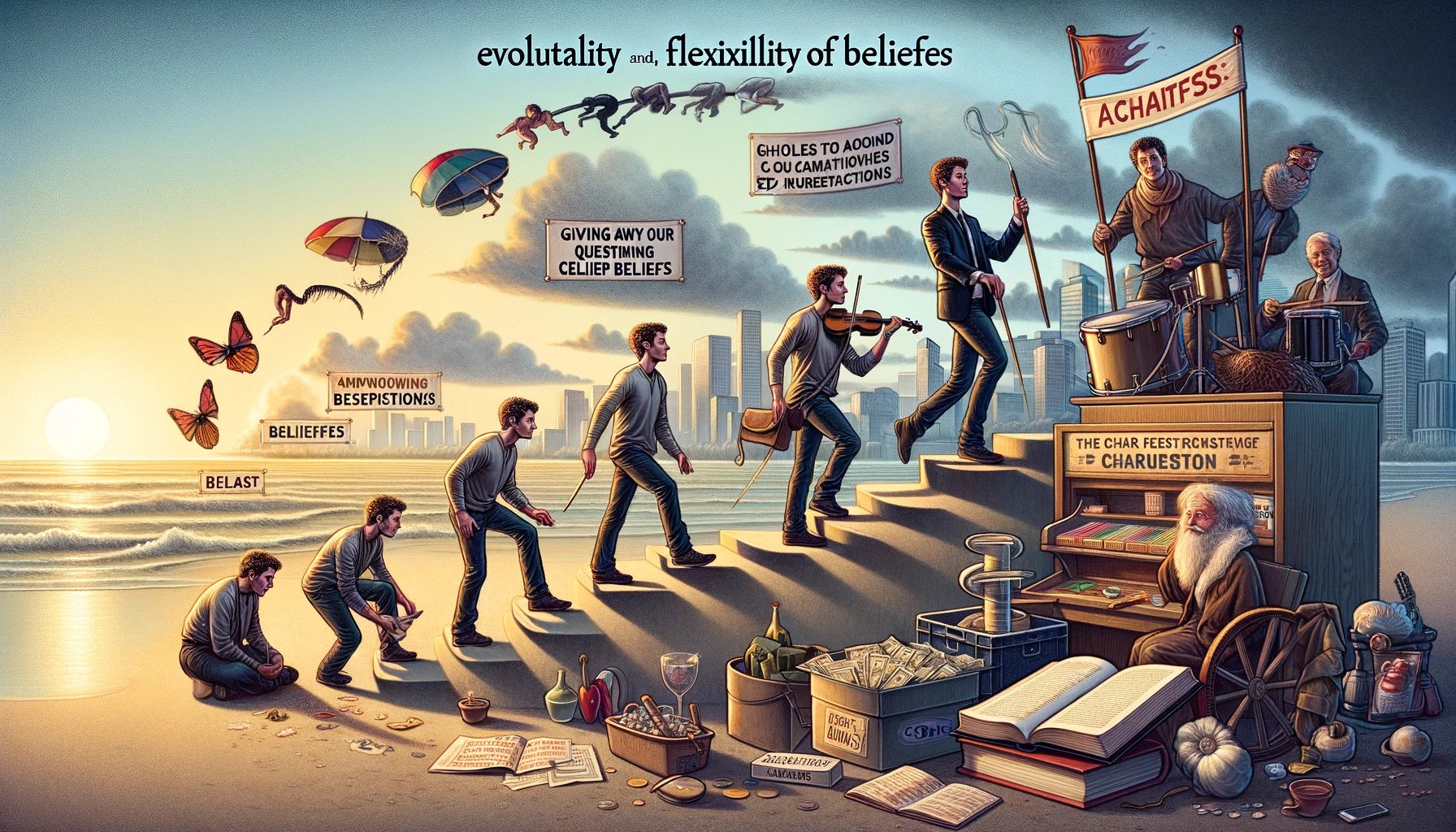Question Your Beliefs and Create Your Own Reality

We all have core beliefs that shape how we see ourselves and the world. Often formed in childhood, these beliefs act as an invisible lens, coloring our perceptions, attitudes, and behaviors in ways we rarely question.
Yet questioning our beliefs and choosing more empowering ones may be the master key to overcoming self-limitation and creating the lives we truly want.
Derek Sivers: A “Grandmaster” at Evolving Beliefs
Derek Sivers is a self-described “grandmaster” at examining and evolving his beliefs. Derek went from scrapping by as a circus performer and musician to building and selling CD Baby for $22 million in his 30s.
He then gave away most of the windfall to charity. Derek continues to question assumptions and adopt new perspectives, a mindset that fuels his creativity and contentment.
In a fascinating interview on the Mark Manson podcast, Derek and Mark explored the puzzling yet critical territory of beliefs: where they come from, which serve us, which hold us back, and how to change them to better serve our aspirations. Derek shared profound and often countercultural insights.
Here are some highlights from the above thought-provoking discussion:
The Illusion of Objective Truth
Derek sees most beliefs not as universal, unchanging truths but as interpretations we subjectively choose, whether consciously or not. “I don’t believe anything I say. I don’t believe anything anyone else says,” he says. “Nothing’s true anyway.”
This anti-dogmatic posture allows him to continually question his own views and remain open to new ones that may serve him better.
Usefulness Over Truth
Given the uncertainty of “truth,” Derek says we are wiser to evaluate beliefs based on their usefulness for becoming our best selves, not their accuracy.
Just think of it as is it useful or not? Is this religion useful to you? Is this religion useful to somebody else? Well, then that’s a better thing to judge it by.
This yardstick also applies to art and fiction. Rather than asking, ‘Is this literally true?’ we can ask ‘Does engaging with this help me flourish?’ We can then accept beliefs provisionally, as long as they bear good fruit.
Choosing Empowering Perspectives
Rather than being passive victims of inherited beliefs, Derek sees us as having a choice:
You can choose any perspective that you want, and you are already choosing a perspective.
The belief that feels intuitively true likely took root thanks to our upbringing and environment. But shifting to a more useful outlook is possible with self-examination. “Everything’s negotiable,” Derek says. We can deliberately pick ways of interpreting life events that inspire rather than deflate us.
Growing Through Hardship
Trials often shake and remake our beliefs more than happy times do. Derek notes major life blows, like job losses or breakups, force us to question assumptions we formerly took for granted, offering opportunities for reinvention.
Whenever somebody has some kind of terrible tragedy in their life...you’re about to have an amazing transformative experience,
Derek says, only partly tongue-in-cheek. “You’re going to be letting go of some habits that you’ve been doing that weren’t rewarding.”
Hardships help us shed once-useful beliefs that have become confining.
Derek’s Top 3 Tips for Evolving Your Beliefs
Drawing from Derek’s wisdom, here are three powerful ways to change limiting assumptions into launchpads for growth:
-
Journal to walk through different interpretations of challenges. This crystallizes fresh perspectives to inform a new course of action.
-
Question yourself rather than just arguing to change others’ minds. Remaining open to being wrong opens you to constructive new lenses.
-
When assessing beliefs, emphasize usefulness over accuracy. Hold as true what serves you and others, not merely what sounds conventionally factual.
Tempering Beliefs’ Downsides
Beliefs that serve us early on can eventually turn against us if we lack self-awareness regarding their limits. Derek sees overconfidence as a common pitfall.
Citing the rise and recent struggles of Kanye West, he notes the entertainer’s seemingly unshakable belief in his talents rocketed him to global fame, but later fed volatile behavior that dimmed his star.
Beliefs that once offered “a tailwind” can become blind spots, causing backlash if we fail to recognize their waxing and waning usefulness.
Exchanging Limiting Beliefs for Empowering Ones
Mark asked Derek for advice on one of the trickiest aspects of working with beliefs: How do we effectively switch out deep-rooted ones that undermine us? He stressed the power of writing to crystallize and internalize new perspectives.
“I journal for hours and hours...walking through the different ways I could think of this thing, whether it's in the past or the future,” Derek said. “I make myself keep going...looking at a bunch of different ways to think about something. And at a certain point, one feels like, ‘Oh, this works.’” This fresh belief can then inform concrete actions, anchoring it.
He also emphasized questioning our own views over trying to argue others’ into submission. “That first step is to think that you might be wrong,” Derek noted.
Without clinging to certainty about our positions, we stay open to divergent ones.
Useful Untruths: Fiction and Myth
The fact that Derek helped develop his fiercely independent worldview without religion grabbed my attention. When he finally engaged spiritual content, he ignored hot button questions about historical or scientific accuracy. Instead, he simply asked, “Is this useful?” This opened him to mining wisdom from sacred texts previously dismissed as obsolete fairy tales.
Derek sees fiction and myth in the same vein – essentially untrue stories with metaphorical value. We need not defend scripture or art as supernaturally inspired or objectively factual to glean utility from them. Some falsehoods offer truer lessons about living than many facts do.
Derek referenced a quote from Picasso:
Art is not truth. Art is a lie that makes us realize truth.
Stories that never happened can unveil inner truths.
Cognitive Flexibility as a Superpower
Mark observed that Derek seems extraordinarily adept at adopting and dismissing beliefs fluidly as their usefulness evolves. Psychologists call this ability “cognitive flexibility.” It enables updating our mental models to align with fresh evidence rather than clinging to outdated ones that once made sense.
Derek acknowledged this flexibility has downsides, like relationships changing more than some partners prefer. Nonetheless, he mostly sees adaptability as serving him. “To me, useful means generally being who you want to be. It’s something that helps you go where you want to go, ultimately be who you want to be,” he said. Nimbly tweaking his beliefs and priorities continually helps Derek become his best self.
Final Takeaway: Questioning Beliefs Unlocks Freedom
As Mark absorbed the insights Derek shared on questioning beliefs, Mark realized this practice offers an ever-relevant, universally accessible form of freedom. Exploring our adopted ideas of self, world, and possibility need not threaten what we hold dear, as we can retain anything that continues to serve us well. But perpetually reevaluating even our most sacrosanct stories provides the chance to slough off accumulated constraints and meet life’s unfolding challenges unburdened.
Derek shows that fluidly updating our truths liberates capacity for reinventing the role we play on the world’s stage. Our sole loyalty rests with whatever beliefs unlock our latent potential without limiting anyone else’s. All else remains ripe for reimagining at our discretion.
Ilias is a SEO entrepreneur and marketing agency owner at MagicSpace SEO, helping small businesses grow with SEO. With a decade of experience as a CTO and marketer, he offers SEO consulting and SEO services to clients worldwide.

